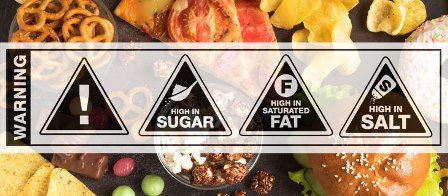
Big changes for food labels in South Africa – including sugar warnings and an end to ‘super-food’
The Department of Health has gazetted a massive 238 page document for public comment, which will aim to make wide-sweeping changes to the way food items are labelled on store shelves in South Africa.
The proposed changes – called the Regulations Relating to the Labelling and Advertising of Foodstuffs – reinforce many rules already in place for product packaging in South Africa, such as ingredient lists and sell-by dates, but also introduce a host of changes for more modern changes in food advertising.
This includes getting rid of trendy descriptions for food like calling products “smart” food, or “intelligent” food.
As part of an overhaul of naming changes, the regulations propose that descriptors like this be prohibited from labelling, along with terms like “wholesome”, “nutritious”, “nutraceutical” or “super-food”.
Any other words, logos or pictorials with a similar meaning in any manner implying that the food is better or superior in any way – including the name and trade name – are also prohibited under the new rules.
The department also wants to clamp down on other claims on the packaging, which may be misleading. While products can still use terms like “grain fed”, “grass-fed”, “Karoo lamb”, “natural lamb”, “country reared”, “free range”, “pure”, etc , these have to be linked to a specific protocol which is approved or registered with the Department of Agriculture, or regulated in terms of the Agricultural Product Standards Act.
In the case of foods that are not regulated in terms of the Agricultural Product Standards Act, statements to the effect of being “fresh”, “natural”, “nature’s”, “pure”, “traditional”, “original”, “authentic”, “real”, “genuine”, “home-made”, “farmhouse”, “hand-made”, “selected”, “premium”, “finest”, “quality”, or “best” or words with a similar meaning are still permitted – but this must be reflected in the ingredients.
Other labels prohibited are endorsements from celebrities, organisations and any medical practitioners, while claims of providing a nutritionally balanced diet are also on the chopping block.
The regulations are also quite forward-looking, gearing up for a generation of new products that will be coming that may be replacing meat. As such the regulations specify that any product where the percentage of meat present is less than 25%, the name or description of the end product may not contain the word “meat”.
Warning labels
As part of the changes, the department is proposing that food items that are high in sugar and fat content come with warning labels attached.
The department wants mandatory front-of-package labelling (FOPL) to be present on any pre-packaged foodstuffs that contain added saturated fat, added sugar, added sodium and which exceed the nutrient cut-off values for total sugar, total sodium or total saturated fatty acids.
The cut-offs are:
Total sugar(s)
- Solids: >10.0g per 100 g
- Liquids: >5.0g per 100 ml
Total Saturated fatty acids
- Solids: >4.0g per 100 g
- Liquids: >3.0g per 100 ml
Total Sodium
- Solids: >400mg per 100 g
- Liquids: >100mg per 100 ml
A similar label must be in place for any item that uses artificial sweeteners.
The FOPL must be clearly visible and, insofar as possible, be integrated into the packaging. The FOPL may not be partially or completely covered by any other element, the department said.
The relevant foodstuffs must display such logos on the front of the package – and they will have to cover 25% of the front of the package.
 https://businesstech.co.za/news/wp-content/uploads/2023/02/Salt-far-sugar-warning-300x209.png 300w" alt="" width="684" height="477" class="aligncenter size-full wp-image-662361" style="height: auto; max-width: 100%; transition: all 0.3s ease-in-out 0s; clear: both; margin: 0px auto; display: block; backface-visibility: hidden;" loading="lazy" data-mce-src="https://businesstech.co.za/news/wp-content/uploads/2023/02/Salt-far-sugar-warning.png" data-mce-style="height: auto; max-width: 100%; transition: all 0.3s ease-in-out 0s; clear: both; margin: 0px auto; display: block; backface-visibility: hidden;" />
https://businesstech.co.za/news/wp-content/uploads/2023/02/Salt-far-sugar-warning-300x209.png 300w" alt="" width="684" height="477" class="aligncenter size-full wp-image-662361" style="height: auto; max-width: 100%; transition: all 0.3s ease-in-out 0s; clear: both; margin: 0px auto; display: block; backface-visibility: hidden;" loading="lazy" data-mce-src="https://businesstech.co.za/news/wp-content/uploads/2023/02/Salt-far-sugar-warning.png" data-mce-style="height: auto; max-width: 100%; transition: all 0.3s ease-in-out 0s; clear: both; margin: 0px auto; display: block; backface-visibility: hidden;" />
Most notably, products which carry these labels may not be marketed to children, and may not make any claim with an energy, health or nutrition message – irrespective of whether their nutritional profile passes the Nutrient Profiling Model used to determine as such.
This poses a huge issue for many of South Africa’s favourite snacks, like potato crisps and sodas – as well as the entire breakfast cereal market, which can carry sugar content as high as 33 g per 100g, and is often directly marketed to children.
The department is taking a hard stance on the marketing of these products, saying that advertisers cannot “abuse positive family values such as portraying any happy, caring family scenario, on a label or package in order to encourage the purchase of consumption.”
Marketing for these products also cannot “omit undesirable aspects of a food’s nutritional profile, contain any misleading or incorrect information about the nutritional value of the product or be represented as a substitute for meals.”
The regulations are open for comment for three months.
News Category
- International retailers
- On the move
- Awards and achievements
- Legislation
- Wine and liquor
- Africa
- Going green
- Supplier news
- Research tools
- Retailer trading results
- Supply chain
- Innovation and technology
- Economic factors
- Crime and security
- Store Openings
- Marketing and Promotions
- Social Responsibility
- Brand Press Office
Related Articles

Warning of Eskom collapse

Knorr recalls brown onion gravy sachets

Eskom CEO shares good news about load-shedding

Tax warning for South African businesses


